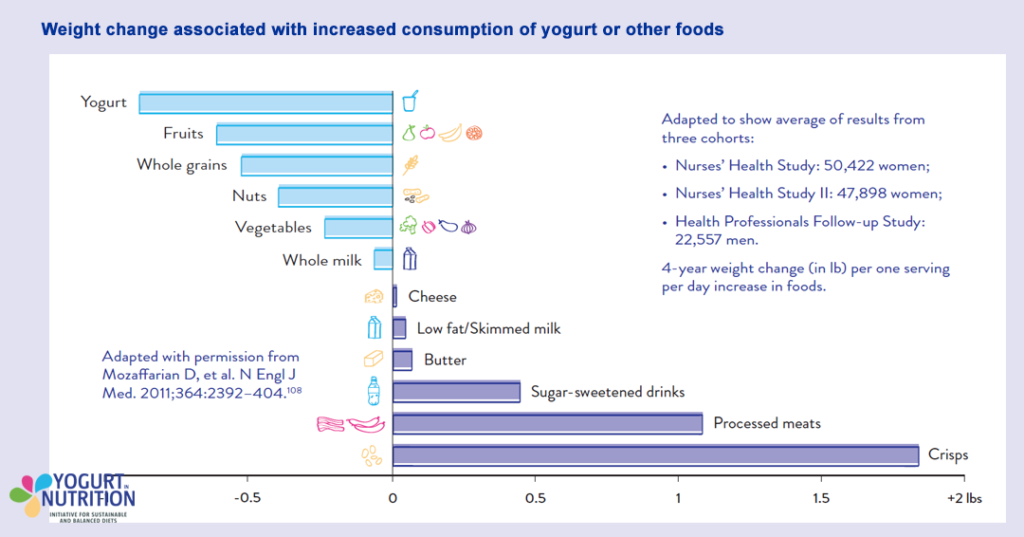Yogurt consumption is associated with reduced body mass index (BMI), reduced body weight or weight gain, thinner waist and reduced body fat.
Yogurt is linked to reduced risk of overweight and obesity and smaller waist circumference
Adults
Yogurt may be classified as a protective food against long-term weight gain, as demonstrated in numerous studies.
A recent meta-analysis including 32,330 individuals (11,947 overweight/obesity cases) across five studies conducted in the USA, Spain and Korea found a 13% reduction in risk of overweight/obesity for every 50 g (~2 ounce) increase in daily yogurt consumption.
Eating more yogurt was associated with less weight gain per 4-year period among 120,877 healthy non-obese adults in the USA followed for 12–20 years. For each additional serving of yogurt per day there were 372 g (~13 ounces) less weight gain over 4 years.
In the USA Framingham Heart Study Offspring Cohort, predominantly overweight people who ate three or more servings of yogurt per week gained about 55% less weight over a year than those who ate less than one serving per week. When it came to waist size, high-yogurt consumers gained 20% less circumference than low yogurt consumers.
Data from the USA NHANES (1999–2014) study revealed a reduced prevalence of obesity in adults associated with consumption of yogurt or a probiotic supplement.
A large Spanish cohort study in non-overweight adults found that people who ate seven or more servings of yogurt per week had a 20% lower risk of overweight or obesity after 6 years when compared with low-yogurt consumers (up to two servings per week).
In a Canadian study, yogurt consumption was associated with lower body weight, waist-to-hip ratio and waist circumference, and tended to be associated with a lower BMI when compared with no yogurt consumption – benefits which were sustained over 6 years of follow up.
In a UK study, increasing consumption of fermented dairy products (low-fat yogurt or cheese) was associated with a smaller increase in body weight among 15,612 adults followed for 3.7 years.
Higher consumption of low-fat yogurt (>3 servings/week) was associated with less visceral and intermuscular fat and smaller waist circumference among women.

Children
Results from the USA NHANES (2005–2008) study of children aged 8–18 years and the Healthy Lifestyle in Europe by Nutrition in Adolescence (HELENA) study showed that yogurt consumption was associated with less body fat compared with non-consumption. Among overweight or obese adolescent girls, increased dairy consumption (4 servings/day of milk, low-fat yogurt, cheese) was associated with improved body composition in the absence of weight loss.
Yogurt may support body weight reduction when dieting
Some evidence exists to suggest that including yogurt in an energy-controlled diet leads to greater weight loss.
A 3-month trial in 34 obese people found that those who included three servings of fat-free yogurt daily as part of an energy-restricted diet lost 22% more body weight and 61% more body fat than those not eating yogurt.
Consumption of yogurt fortified with calcium, protein and probiotics within a low energy diet versus a low energy diet without yogurt or with plain yogurt led to greater improvement in BMI, waist circumference, body fat percentage and reduction in body fat mass among obese people over 8–10 weeks.
How might yogurt influence body weight and body fat?
Several theories have been put forward.
- Yogurt consumption increases the feeling of fullness and decreases the feeling of hunger.
- Yogurt consumers tend to choose healthy diets and healthier lifestyles compared with non-consumers
- Live bacteria in yogurt may beneficially alter the gut microbiota and influence weight, although the mechanism for this is as yet unclear.
- Calcium in yogurt may affect body fat by reducing its absorption from the intestine, increasing breakdown of fats,125 and causing less fat to be stored in fat cells.
- Yogurt naturally contains B vitamins and fortification of yogurt with complementary B vitamins may contribute to body weight management through modification of energy-yielding metabolism this has been shown to aid weight loss among overweight and obese people.
- Obesity is accompanied by chronic, low-grade inflammation in various tissues. A Brazilian population-based study suggested that increasing yogurt consumption may protect against inflammation.
“Increasing yogurt consumption is proportionally associated with lower body weight and reduced weight gain over several years. Daily yogurt consumption is also linked to other indicators of healthy body composition including lower body fat and smaller waist circumference, both in adults and in children. “
References:
- Saviano DA, Hutkins RW. Yogurt, cultured fermented milk, and health: a systematic review. Nutr Rev. 2021;79:599–614.
- Eales J, Lenoir-Wijnkoop I, King S, et al. Is consuming yoghurt associated with weight management outcomes? Results from a systematic review. Int J Obes (Lond). 2016;40:731–46.
- Sayón-Orea C, Martínez-González MA, Ruiz-Canela M, et al. Associations between yogurt consumption and weight gain and risk of obesity and metabolic syndrome: a systematic review. Adv Nutr. 2017;8:146S–54S.
- Sochol KM, Johns TS, Buttar RS, et al. The effects of dairy intake on insulin resistance: a systematic review and meta-analysis of randomized clinical trial. Nutrients. 2019;11:2237.
- Feng Y, Zhao Y, Liu J, et al. Consumption of dairy products and the risk of overweight or obesity, hypertension, and type 2 diabetes mellitus: a dose-response meta-analysis and systematic review of cohort studies. Adv Nutr. 2022;13:2165–79.
- Mozaffarian D. Dietary and policy priorities for cardiovascular disease, diabetes, and obesity: a comprehensive review. Circulation. 2016;133:187–225.
- Mozaffarian D, Hao T, Rimm EB, et al. Changes in diet and lifestyle and long-term weight gain in women and men. N Engl J Med. 2011;364:2392–404.
- Wang H, Troy LM, Rogers GT, et al. Longitudinal association between dairy consumption and changes of body weight and waist circumference: the Framingham Heart Study. Int J Obes (Lond). 2014;38:299–305.
- Lau E, Sergio Neves J, Ferreira-Magalhaes M, et al. Probiotic ingestion, obesity, and metabolic-related disorders: results from NHANES, 1999–2014. Nutrients. 2019;11:1482.
- Martinez-Gonzalez MA, Sayon-Orea C, Ruiz-Canela M, et al. Yogurt consumption, weight change and risk of overweight/obesity: the SUN cohort study. Nutr Metab Cardiovasc Dis. 2014;24:1189–96.
- Sayón-Orea C, Bes-Rastrollo M, Martí A, et al. Association between yogurt consumption and the risk of metabolic syndrome over 6 years in the SUN study. BMC Public Health. 2015;15:170.
- Panahi S, Doyon CY, Despres JP, et al. Yogurt consumption, body composition, and metabolic health in the Québec Family Study. Eur J Nutr. 2018;57:1591–1603.
- Trichia E, Luben R, Khwa KT, et al. The associations of longitudinal changes in consumption of total and types of dairy products and markers of metabolic risk and adiposity: findings from the European Investigation into Cancer and Nutrition (EPIC)–Norfolk study, United Kingdom. Am J Clin Nutr. 2020;111:1018–26.
- Murphy B, Talegawkar SA, O’Connor J, et al. Association between dairy product intake and body composition among South Asian adults from the Mediators of Atherosclerosis in South Asians Living in America (MASALA) study. Br J Nutr. 2021;126:1100–9.
- Moreno LA, Bel-Serrat S, Santaliestra-Pasías A, et al. Dairy products, yogurt consumption, and cardiometabolic risk in children and adolescents. Nutr Rev. 2015;73(Suppl 1):8–14
- Calleja M, Caetano Feitoza N, Falk B, et al. Increased dairy product consumption as part of a diet and exercise weight management program improves body composition in adolescent females with overweight and obesity: a randomized controlled trial. Pediatr Obes. 2020;15:e12690.
- Chen M, Pan A, Malik VS, et al. Effects of dairy intake on body weight and fat: a meta-analysis of randomized controlled trials. Am J Clin Nutr. 2012;96:735–47.
- Jacques PF, Wang H. Yogurt and weight management. Am J Clin Nutr. 2014;99(5 Suppl):1229S–34S.
- Zemel MB, Richards J, Mathis S, et al. Dairy augmentation of total and central fat loss in obese subjects. Int J Obes (Lond). 2005:29:391–7.
- Razmpoosh E, Zare S, Fallahzadeh H et al. Effect of a low energy diet, containing a high protein, probiotic condensed yogurt, on biochemical and anthropometric measurements among women with overweight/obesity: A randomised controlled trial. Clin Nutr ESPEN. 2020;35:194–200.
- Mohammadi-Sartang M, Bellisimo N, Totosy de Zepetnek JO, et al. The effect of daily fortified yogurt consumption on weight loss in adults with metabolic syndrome: A 10-week randomized controlled trial. Nutr Metab Cardiovasc Dis.2018;28:565–74.
- Kallus SJ, Brandt LJ. The intestinal microbiota and obesity. J Clin Gastroenterol. 2012;46:16–24.



